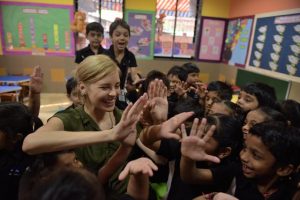Travellers in Classrooms enable cultural dialogue
Teaching children that there’s more than one side to a story is essential, feel the authors.

W orld over, we are in the middle of a major shift on the political front. From laughable examples of leadership to pitiful tales of people being sidelined in the aim of achieving diplomatic clout, we have seen it all. Increasingly, the scene has begun resembling a primary school playground, where little children are ready to take non-issues to new levels simply because they don’t understand perspectives. Still something that is excusable on the playground, is scary to see unfolding on a political stage.
The bigger question is not what we can do to fix the today, but how we can ensure this doesn’t escalate tomorrow. A lot of arguments erupt only because we don’t understand how to empathise or understand the other person’s point of view. This, honestly, is the root of all our concerns in the adult world. Without understanding, it is extremely easy to judge, misunderstand and jump to conclusions. This is a fairly sad state of affairs, really, because inculcating understanding is as easy as sitting across the table and having a chat.
“During a recent video chat activity conducted on International Day of Friendship with the Embassy of Georgia in New Delhi, one youngster from a school in Mumbai asked a pertinent question: How can we end wars?”
To this, a delegate from the embassy, Mr. Rati Asatiani answered, “We need dialogue and cultural understanding”. If the recent International Day of Friendship taught us anything, it’s this! Learning of different cultures, different people, embracing and understanding can truly end wars.
“This is where ‘Clap Global – Travellers in Classrooms’ enables cultural dialogue between international travellers and Indian students through Clap Talks. Here, the traveller visits local Indian classrooms and shares stories about his/her life, work and culture with the students who in turn, ask questions, express opinions and introduce the traveller to their way of life.”

These conversations begin with the traveller sharing about his/her life, something that he or she feels strongly about and sharing souvenirs from back home. It helps bridge cultural gaps, dispel socio-cultural stereotypes and also influence how a whole classroom full of kids perceives a country and its people.
When we dream of a harmonious, globalised world, we should envision it as being led from the top by leaders who understand people, and not merely politics. Without one, the other is incomplete, and without dialogue, diplomacy is a farce.
How many of us know that Georgia has an alphabet system of its own? Do you know that the country has multiple ecosystems contained in its borders that allow you to go swimming and skiing in one day?
“How many of us know that there are some countries in Europe that enjoy spicy food almost as much as we do, in India? How many of us know who a ‘refugee’ really is, as a person?”
If we want to see peace, we must take the trouble to get to know each other. If you’ve eaten at the same table with someone, or compared notes on how annoying yet wonderful younger siblings can be, it becomes easier to empathise with them and harder to fight them. By exposing our children to different cultures, people and ways of life, we can teach our children to choose compassion over judgement and collaboration over competition. So, let’s do all we can to build a world of dialogue.
